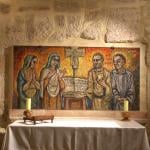Giving full marks to Tom, the lengthy discussion on Rom. 11.1-32 which stretches to some 70 plus pages (to p. 1265 in fact) is one of his best in this huge work. And it needed to be, because his position on Rom. 11 is difficult to defend in light of the water that has already gone under the bridge in Rom. 9 and 10. He goes into more detail here than in the treatment of the other relevant passages that may say something about the future of non-Christian Israel, because there is more meat on the bone here. And Tom is of course right, that Paul is in uncharted waters. Early Jews didn’t think Messiah would come, get crucified, largely reject their own Messiah, and then there would be an interval between the resurrection of the Messiah and everyone else (and everything else auguring new creation). Paul is the first person, so far as we know to speak into such a situation and try and make sense of it. Pursuing his chiasms within chiasms approach he starts with 11.13-15 where Paul suggests that perhaps his ministry to the Gentiles and their salvation might make non-Christian Jews jealous and perhaps he can ‘save some of them’. Then he adds “for if their casting away means reconciliation for the world, what will their acceptance mean but life from the dead’. Not surprisingly, Tom does not take that last phrase to refer to the future bodily resurrection of anyone. He assumes rather it refers to the same thing as the phrase ‘save some of them does’. In other words, it is not a remark about the eschatology future of Israel, but of the more immediate possible future of some Jews. The argument however becomes convoluted.
For one thing ‘their casting away’ cannot possibly refer to the rejection of Christ by Jews but on p. 1198, this is what Tom suggests “if Israel has embodied the casting away of the Messiah, Israel will now find a way to share in his resurrection”. Here is one of those places where this amounts to over-reading Christology into a statement about ethnic Israel itself. Much nearer the mark is Hays suggestion that the temporary breaking off of Jews from the people of God, makes room for the Gentiles to come into the people of God, and so their rejection is for the sake of the world. In fact however, Paul doesn’t really explicitly say this either. And here is a rule of thumb. In an already complex argument, it’s not a wise move to try and make it even more cryptic by a certain kind of Christological interpretation. Tom of course is simply assuming that since Christ is the representative of Israel, what is true of him is true of them (p. 1199). This frankly does not follow. A representative still has an individual identity and not everything that is true of him is going to be true of the people he represents. Jesus is not Israel, he is Israel’s savior and representative. Were he all that was left of Israel, all he would need to do is save himself, something he adamantly refuses to do (and does not need to do. You need to be lost if you require being saved). The logic of the argument here is weak.
To parry the more obvious sense of the phrase ‘life from the dead’ (=resurrection of the body), Tom suggests the language here is like that in Rom. 6– ‘dead to sin and alive to God’. The latter is indeed not about something that happens at the eschaton. But this language is not the same as ‘life from the dead’ or more specifically ‘life from the dead ones’. Notice Paul does not say life from out of death, but life ‘ek nekron’!! Now the real parallel to this is not the language in Rom. 6.11 and the discussion there of burial with Christ. The closest parallel is actually in 1 Cor. 15 where Paul talks about ‘anastasis ek nekron’ and there there is no question he is referring to bodily resurrection. Indeed, he is suggesting that Christians will be raised from out of the rest of the dead ones first, when Christ returns. ‘Christ the first fruits of the res. and then those who are in Christ, when he returns. If there are echoes here of any earlier Pauline discussion it is the one in 1 Cor. 15 surely.
Thirdly, the argument on p. 1200 goes further off the rails when it assumes that ‘if possible saving some of them’ means the same thing as ‘what will their acceptance mean but…’ This is to ignore that this kind of argument is a ‘how much more so’ type of rhetorical argument. If this is true, how much more so will the latter also be true. Their ‘acceptance’ surely refers to their acceptance back into the people of God later. Paul is thus saying— if some of them are saved now and it produces this kind of good effect for you Gentiles, how much more will their full acceptance means, indeed it will signal the resurrection of the dead at the return of Christ. The point of the argument, and Tom is right that this argument is directed at the Gentile Christians in Rome, is not merely to say that a few Jews have a present possibility of being saved so you Gentile Christians be nice to them, but also that God still has plans for them in the future, so you need to abandon any replacement theology or hubris you might have had in mind, as if God had abandoned, now and later, his first chosen people. Not so, says Paul.
I agree with Tom’s point on p. 1202 that Paul expects realistic results in the present— he might save some, and the citing of the parallel in 1 Cor. 9.22– ‘in order that by all means I might save some’ is apt. Tom is probably also right that the jealousy motif comes from Deut. 32.21 (see Rom. 10.19). Rom. 11.12 refers to ‘their fulness’ which surely means something more than ‘save some of them’. It refers to their future ‘acceptance’ mentioned in 11.15. Even much less convincing is Tom’s argument on pp. 1204-05, where he tries to suggest that the discussion about Paul’s kinsmen according to the flesh (sarx), harks back to his discussion of the sinful inclination in Rom. 7 (also sarx). Sinful flesh (or fallen bodily inclinations) is a moral issue, flesh, as in flesh and blood, is a morally neutral use of the term sarx. The use of kata sarx in Rom. 9.4-5 etc. my kin according to the flesh, has nothing to do with the discussion of fallen inclinations in Romans 7. And we have already pointed out the problem with reading Romans 7 as if it were the story of both Adam and Israel and Israel in Adam. The Adam story is clearly there from Romans 5.12-21 on. The Israel story not so much. On p. 1206 Tom rightly says Paul is attacking a sort of replacement theology (Gentiles replace Jews as God’s chosen ones). And while attacking that he is arguing for an inclusion theology– Gentiles being included in the people of God, who happen to be Jews, more specifically Jewish Christians, as we shall see. I do however think Tom is right to insist on p. 1208– “This [i.e. Rom. 9-11] was never an abstract doctrine of predestination attempting to plumb the mysteries of why some people hear and believe the Gospel and others do not. Paul never encourages speculation of that sort.” Just so.
Especially unconvincing is the treatment of ‘fullness’ (pleroma) in 11.12 on p. 1209. Tom suggests it means “that he will save some, in other words considerably more than at present…and that this will count as a ‘fulness’ and…that this will be the full extension of the small but growing remnant of which, he, Paul is himself a part.” If ‘some’= ‘fulness’ here, then Paul is a very poor rhetorician indeed, and the eschatological future of Israel as in numerous OT prophetic passages is not as advertised. ‘Fulness’ in this part of Rom. 11 needs to be compared to ‘when the full number of Gentiles comes in’ later in this chapter.
On the other hand, Tom can be commended on p. 1210 for stressing that we do not have a felix culpa, or fortunate fall theology in the Bible. God did not plan the fall because it would give him the excuse to send someone better than Adam to be his representative and ruler on earth. No, as Tom says, Paul “would have said that one who was from all eternity equal with God…would have appeared anyway ‘when the time had fully come’ not then to redeem, but to rule gloriously over the completed creation.” I agree.
Paul is something of a master at mixing metaphors, and in 11.16a we hear about the first fruits as opposed to the whole lump, as well as the root and the branches. Now it seems clear enough, and here Tom agrees, that the olive tree is a symbol of Israel, for sure. Who then are the first fruits and the root, as opposed to the whole lump and the branches? Since the discussion goes on to talk about unbelieving Jewish branches being broken off and Gentile ones being grafted in contrary to good horticulture. The first fruits then may be Jewish Christians, while the root maybe the patriarchs, in particular Abraham and kin (see p. 1212). I think it is unlikely that ‘Christ the first fruits of the resurrection’ is in view in the first phrase, but that metaphor is used that way in 1 Cor. 15. And Tom is right that whatever we make of these metaphors, Paul is not likely arguing that all currently unbelieving Jews will one day be automatically saved. No, as Tom says, the argument is “they are not automatically NOT saved”, that is they are not hopelessly lost forever, even if temporarily these unbelieving branches have been broken off from the people of God. Again, Paul is warding off a certain sort of replacement theology he was worried the Gentile audience might be embracing as anti-Semitic Romans might be apt to do.
On p. 1214, Tom stresses that Paul is insisting that there are no two peoples of God, one for gentiles to be included in, and one for Jews. True enough, but that is not the whole story because the story of Israel is not yet finished. Christ’s first coming does not finish that story or complete it, Christ’s second coming does. And here is where it gets tricking. Jews who don’t believe in Jesus are temporarily (underscore that word) broken off from the people of God, while Jewish Christians are the first fruits of the eschatological people of God. To this first fruits is being grafted in many Gentile branches, but that is also not the end of the story. Paul will go on to say that the full number of Gentiles must come in by grace through faith in Jesus, and then something else is going happen. The natural reading of 11.25 is that ‘in like manner’ (by grace through faith in Jesus’ all Israel will be saved at or just after Jesus returns and raises the dead in Christ. What this means of course is that non-Christian Israel at the moment is provisionally out, but only pro tempore. This is not replacement theology, it is two stage developmental and completion theology, especially when broken off branches can be re-integrated into the people of God. It is this incompletion of things that leads Paul to both insist on their is only one people of God, but also not be prepared to call the current church, the Israel of God, because the latter term always refers to Jews. Are gentiles currently being merged into a union with Jewish Christians, who are part of Israel? Yes they are. But that is only stage one of the grand finale of God’s people. More on this in the next post.











